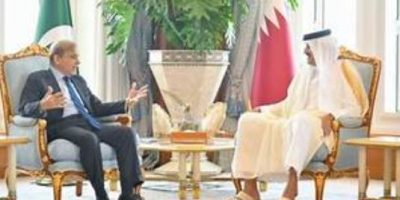UN diplomat advocates for Taliban participation in global conference on Afghanistan

ISLAMABAD, JUN 12 /DNA/ – The Islamic Emirate is doing a fairly notable job to achieve an inclusive system of governance in Afghanistan. However, a socially cohesive Afghanistan requires it to increase so that every Afghan citizen feels that they equally belong to the country and the government equally belongs to them. UNAMA is also engaging with all Afghans to help them achieve a broad-based governance system that includes everybody.
These remarks were made by the head of the Pakistan-based liaison office for the U.N. Assistance Mission in Afghanistan (UNAMA), Malick Ceesay, during the 4th round of Pak-Afghan Religious Scholars Dialogue, organized by the Center for Research and Security Studies (CRSS).
In his interaction with the participating religious scholars from the two countries, Ceesay noted that the Taliban have allowed Afghan females to work in some public offices related to passport, immigration, healthcare, and agriculture, but these concessions have been overshadowed due to bans on the remaining women’s access to employment and girls’ education beyond grade six.
He emphasized the importance of the easement of restrictions on women’s access to education and employment and an inclusive system of governance in the country to pay the way for its recognition.
“Islam never says that women should not go to school, and Islam never says that women should not go to work. Which (version of) Islam and which Quran says that? It’s not found in there,” he added.
Ceesay encouraged the Taliban to attend a conference on Afghanistan later this month, stating that it would help return much-needed global attention to the crisis-ridden country, as Ukraine war and Gaza hostilities had dramatically shifted the international attention from Afghanistan and that’s a concern for the United Nations. “We don’t want Afghanistan to be forgotten”, he said.
“We are hopeful that this time around, the Islamic Emirate will send its representatives (to Doha) to be able to engage with the international community in a constructive and effective manner, the U.N. diplomat said.
While moderating the two-day dialogue, the former chairman of the Council of Islamic Ideology (CII), Dr. Qibla Ayaz highlighted the potential of religious diplomacy to serve as an unofficial communication channel between two countries’ leadership and people and help address the issues of bilateral, regional, and international concern.
He urged both sides to let go of the bitter baggage of history and foster vision-oriented engagement at different levels of the relationship in the interest of the two countries’ connected future. Speaking about the role of media in shaping perceptions, especially of the public on both sides, Dr. Ayaz cautioned about negative propaganda in the cyber-space and the need to critically perceive the information available in the online medium.
Discussing the girls’ education in Afghanistan, he urged Taliban leadership to consider the international community’s offer – like the ones made by Turkey and Indonesia – to improve the country’s educational landscape and cultivate an environment conducive to girls and women empowerment.
Founding chairman of the UK-based Forum for International Relations Development (FIRD), Toaha Qureshi moderated one of the sessions during the gathering and shared the UK’s counter-terrorism experience and how community-ledapproaches – that onboard community stakeholders as part of the solution and not view them as part of the problem -serve as an inclusive model to tackle the security threats.
During the discussions spanning two days, the participating religious scholars from both sides deliberated several proposals concerning different areas of relationship between the two sides and the stability of the region at large.
They urged the Afghan government to address the barriers to girls’ education related to curriculum and infrastructure and launch teachers’ capacity-buildingprograms with the support of international donor bodies and institutions.
They stressed the need to ensure women’s access to employment opportunities to prevent socioeconomic regression in Afghanistan, and appointments of key personnel and representatives on merit, ensuring that all socioeconomic, political, and ethnic groups are included.
Committees comprising common citizens, and key community representatives such as religious scholars, tribal leaders, academicians, and government officials to discuss issues and tackle challenges on the grassroots level were recommended.
It was underscored that religious clerics should reach out to Shuras and relevant IEA authorities and convey the forum’s messages to amplify advocacy. Similar dialogues should be held in Kandahar, Kabul, Quetta andChaman, to ensure a broader and stronger representation of influential figures.
Emphasizing the counter-terrorism role of the religious community, it was recommended that Ulema from both sides should categorically condemn all kinds of terrorism as a common enemy along with the counter-terrorism cooperation between the two sides that catalyzes concrete joint actions against the militant outfits straining relations between the two countries.
Both sides also emphasized non-military measures – such as mechanisms anchored in multitrack dialogues – and the need to maximize and keep them open for smooth communication no matter how strained the political relations.
Addressing the gathering, the executive director of CRSS, Imtiaz Gul noted that counter-terrorism has become an inalienable part of conversations between two sides. Pakistan expects Afghanistan to realize and acknowledge its security concerns, and jointly tackle the terror threats that bedevil the relations. He urged the participating religious scholars to introspect and find a solution to contentious issues like terrorism.
“We are also hoping that before the upcoming Doha summit, both sides will come forward and try to resolve this long-standing issue”, he said.
Related News

Shehbaz, Qatar Amir Pledge to Strengthen Fraternal Relations
LONDON, FEB 17: Prime Minister Muhammad Shehbaz Sharif held a telephone conversation with His HighnessRead More

Experts call for ‘One-Stop’ crisis centers to combat VAW as cybercrime surges
ISLAMABAD, Feb 17: Experts and digital rights advocates have stressed the need for an urgentRead More


Comments are Closed